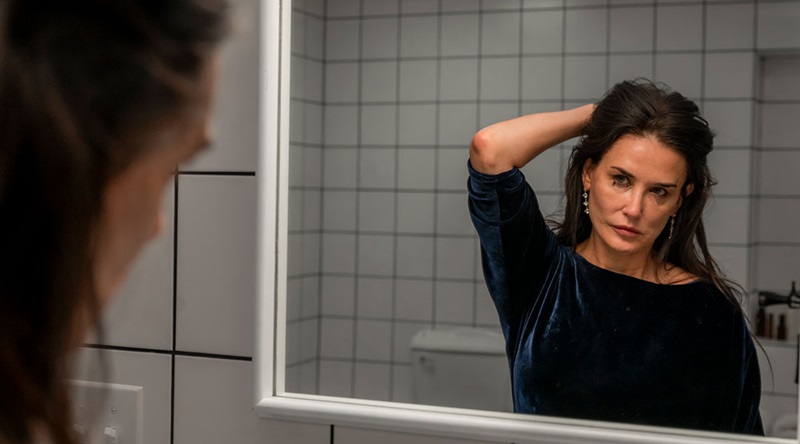Review: ‘The Substance’ impossibly tries to balance competing interests

A scene from ‘The Substance’ courtesy of TIFF
‘The Substance’ takes body horror to new depths as a woman’s attempts to recapture her youth has disastrous results.
Media in general and social media in particular have done significant damage to perceptions of beauty and body types. Everywhere, people are bombarded with someone’s concept of the ideal, which usually excludes the majority of the population, whether it’s a matter of height, weight, age or proportions. This has led to the prominence of eating disorders, body dysmorphia and other mental health issues. Hollywood has specifically been a major contributor to these issues, historically aging out actresses when their physical appearances begin to change — a predicament men rarely encountered. The Substance presents a solution to the problem, but with unimaginable consequences.
Elisabeth Sparkle (Demi Moore) was America’s sweetheart, earning a star on the Walk of Fame and the love of her adoring fans. When the acting roles became scarce, she shifted to television, hosting a fitness program. But when an executive (Dennis Quaid) decides it’s time to pull the plug, Elisabeth makes one last desperate attempt to save her career. The Substance is a self-administered drug that clones the user, only using the best parts of them to create an other — younger, firmer and more attractive. The birth of Sue (Margaret Qualley) is the resurrection of Elisabeth’s heyday that she experiences from afar. However, the catch is only one of them can be active at once and they must switch every seven days — without fail. When the balance is abused, there are irreversible consequences.
There’s a bravery to allowing a camera to capture one’s naked form and even greater courage in projecting it on a screen of any size, let alone the big screen. Writer-director Coralie Fargeat treats nudity as not only one of life’s essentials, but as a method of exposing all of our insecurities — there’s nowhere to hide from the mirror or the camera. Even worse, after the treatment, Elisabeth wakes up to a perfect alternative of herself every week, embellishing every perceived flaw in her own body and making it difficult not to compare. Qualley is at peak physical condition, so the camera fetishizes her form with extreme close-ups that follow her curves as she looks tantalizingly into the lens and exercises away the non-existent fat. Conversely, Moore takes a much grander risk as she’s not only naked, but drawing attention to all the effects of aging that prompt her to seek the treatment: wrinkles, cellulite and just an overall lack of elasticity. It’s dreadfully relatable.
The cinematography and editing play a major role in conveying the characters’ perceptions of themselves, as well as the implications of using the substance. Unsettling close-ups and a claustrophobic hallway in Elisabeth/Sue’s apartment are key tools in distorting views and communicating their hysteria. In addition, all the text that accompanies the treatment is all-caps, including labels, instructions and warnings. This makes it easy to focus on the specific words that apply to a given moment, such as “YOU ARE ONE” — a sentiment easily forgotten when they’re forced to exist separately but co-dependently.
The first two acts are a familiar style of body horror with both women struggling to maintain the required balance. However, the more successful Sue becomes, the more Elisabeth deteriorates mentally and, eventually, physically. The treatment itself is also grisly, from the upsetting reproduction to the grim therapy required to keep them both alive — anyone with a fear of needles may want to look away. That said, the last act goes to unexpected extremes that disrupt the narrative flow, but emphatically emphasize the key message. The initial story about the difficulties of maturing gracefully gives way to a full-on monster movie, completely changing the tone of the movie and haphazardly pointing out the absurdity of the societal value assigned to appearances.
Director: Coralie Fargeat
Starring: Margaret Qualley, Demi Moore and Dennis Quaid
Review: ‘The Substance’ impossibly tries to balance competing interests
#Review #Substance #impossibly #balance #competing #interests





